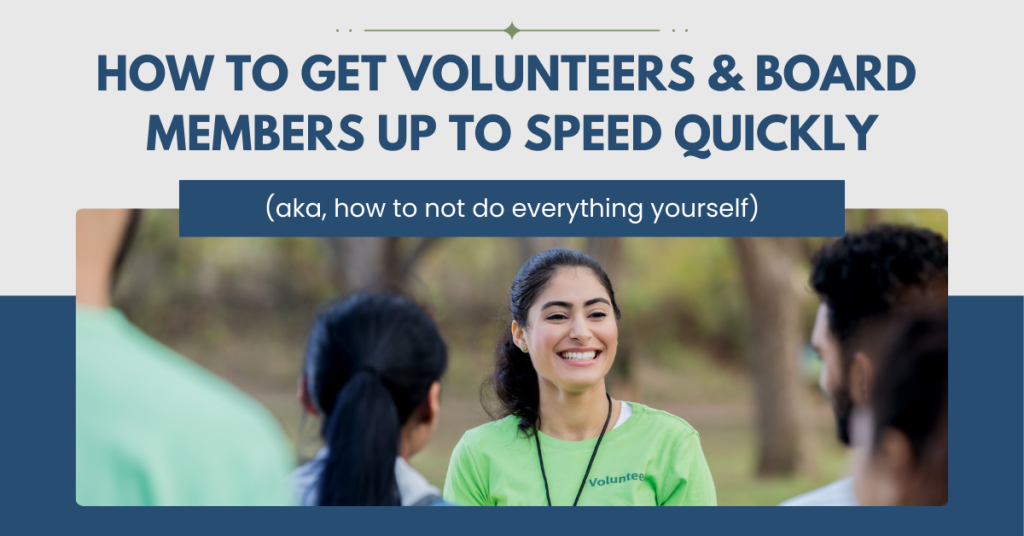
As a leader, it can be frustrating when it feels easier to do everything yourself rather than delegate tasks to others. However, building a team or community to help can alleviate stress and further your cause. In this episode of the Two Minute Treasurer’s Tip Podcast, you’ll find tips to make the most out of utilizing valuable volunteers and creating a successful team.
Training New Board Members and Volunteers (Rather Than Doing it All Yourself)
Welcome to the Two-Minute Treasurer’s Tip Podcast. I’m Cyndi Meuchel, and today we’re talking about how to get your new board and volunteers up to speed quickly.
Does it sometimes feel like more work to get people on board and helping in a meaningful way than to simply do it yourself? That’s a super common issue amongst leaders, and it seems nobody has enough time anymore, and the idea of training someone to do something that you could do in 15-minutes can leave you feeling annoyed, or worse yet, resentful. Not to mention, if they go MIA on you and they don’t follow thru, their task now becomes your emergency.

However, it’s super important to build a community or a team that can lend a hand, alleviate some of the stress, and the workload, and to help advance your cause. Plus, doing too much yourself can lead to volunteer burnout, which would hurt your overall mission in many ways.
So, rather than get annoyed and do it all yourself, which I’m sometimes guilty of, I’ve got some tips for you that might help you wade into the pool of utilizing those valuable volunteers.
First of all, start small. Don’t give them a giant project to accomplish right out the gate. Give them a small piece of it. Preferably something that requires little skill. And give them a deadline. Once they get that done, give them another, and just keep building on one success after another.
Consider matching their background or their skillset, if you know it, with the job. For example, if you have a parent who, in their professional life is a project manager or an event coordinator, you’ll likely be able to utilize those skills to chair a big event one day. Or, if a volunteer in their professional life caters events, perhaps you can put them in charge of the snacks at your event, or maybe even a concession stand.
Another strategy is to pair someone new with one of your more seasoned volunteers. That way you can cross train so you have more than one person that knows how to do a particular job. They might even start by simply shadowing the person already responsible for the role. They can learn by watching, and then they’ll be more prepared to jump into the hot seat next time.
This might be obvious, but make sure you set your volunteers up to success rather than failure. Give them the tools, and the resources, and the assistance that they might need to get the job done. Don’t make assumptions that they already know how to do it. And on the flip side, don’t micromanage.
Lastly, be sure to thank them. I don’t know about you, but acknowledgement sure goes a long way toward making me want to volunteer again.
That’s it for today! Thanks for listening! If you have a question I can answer, just email me:
[email protected].
 Connect your Venmo account to MoneyMinder PRO to directly download transactions, saving you time and effort. You just review the transactions to ensure they are properly categorized and fill out any required fields.
Connect your Venmo account to MoneyMinder PRO to directly download transactions, saving you time and effort. You just review the transactions to ensure they are properly categorized and fill out any required fields. Connect your Bank, Paypal and Square accounts to MoneyMinder PRO to directly download transactions, saving you time and effort. You just review the transactions to ensure they are properly categorized and fill out any required fields.
Connect your Bank, Paypal and Square accounts to MoneyMinder PRO to directly download transactions, saving you time and effort. You just review the transactions to ensure they are properly categorized and fill out any required fields. Connect your Bank, Paypal and Square accounts to MoneyMinder PRO to directly download transactions, saving you time and effort. You just review the transactions to ensure they are properly categorized and fill out any required fields.
Connect your Bank, Paypal and Square accounts to MoneyMinder PRO to directly download transactions, saving you time and effort. You just review the transactions to ensure they are properly categorized and fill out any required fields. Join It is a membership management service that helps businesses and nonprofits effectively sell, track, and grow their membership.
Join It is a membership management service that helps businesses and nonprofits effectively sell, track, and grow their membership. Connect your Bank, Square and PayPal accounts to MoneyMinder PRO to directly download transactions, saving you time and effort. You just review the transactions to ensure they are properly categorized and fill out any required fields.
Connect your Bank, Square and PayPal accounts to MoneyMinder PRO to directly download transactions, saving you time and effort. You just review the transactions to ensure they are properly categorized and fill out any required fields.